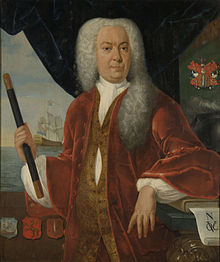Adriaan Valckenier
| Adriaan Valckenier | |
|---|---|

Portrait of Adriaan Valckenier
|
|
|
Governor-General of the Dutch East Indies |
|
|
In office 3 May 1737 – 6 November 1741 |
|
| Preceded by | Abraham Patras |
| Succeeded by | Johannes Thedens |
| Personal details | |
| Born |
6 June 1695 Amsterdam, Dutch Republic |
| Died | 20 June 1751 (aged 56) Batavia, Dutch East Indies (present-day Indonesia) |
Adriaan Valckenier (6 June 1695 – 20 June 1751) was Governor-General of the Dutch East Indies from 1737 to 1741. Mainly remembered for his involvement in the 1740 Batavia massacre, Valckenier later died in a prison in Batavia (present-day Jakarta).
Valckenier's father, an alderman and secretary in Amsterdam, was an official of the Dutch East India Company based in Amsterdam. Valckenier's grandfather was Gillis Valckenier, one of the great regents of Amsterdam during the later Dutch Golden Age. On 22 October 1714, Adriaan left on board the ‘Linschoten’ to be assistant buyer (onderkoopman) in the Dutch East Indies, where he arrived on 21 June 1715 at Batavia.
In 1726, he became merchant and chief buyer (opperkoopman); in 1727 he was "Accountant General" (boekhouder-generaal) of the Dutch Indies; in 1730, he was appointed to the Council of the Indies (Raad extra-ordinair), and, in 1733, as a full "Councillor". In 1736, he was made "First Councillor" and "Director-General", but was beaten to the post of Governor General by Abraham Patras. When Patras died (3 May 1737), Valckenier was named Governor General by the Council of the Indies on 3 May 1737.
It was during the rule of Adriaan Valckenier that the notorious slaughter of Chinese took place in Batavia (the so-called Chinese Massacre). A previous Governor General (Henricus Zwaardecroon) had encouraged many Chinese to come to Batavia. The population was approaching 50% of Chinese provenance. They worked in the construction of the houses and fortifications of Batavia and on the sugar plantations outside the city. Many Chinese merchants also took a leading, if (from the Dutch point of view) illegal, role in the trade with China. From 1725 the sugar trade began to collapse, partly because of competition from Brazil and coffee was added.
...
Wikipedia
